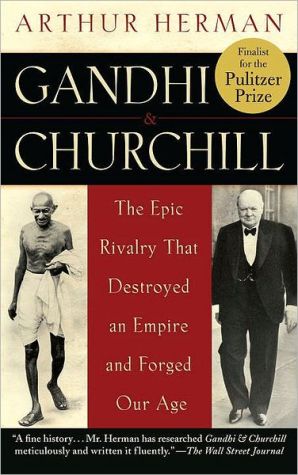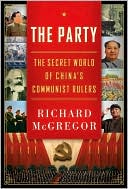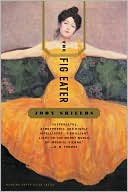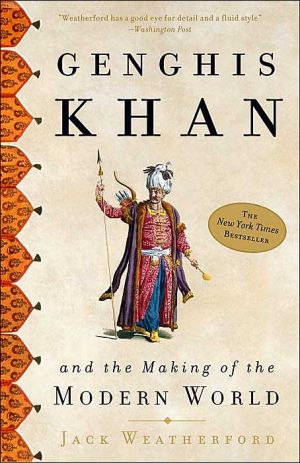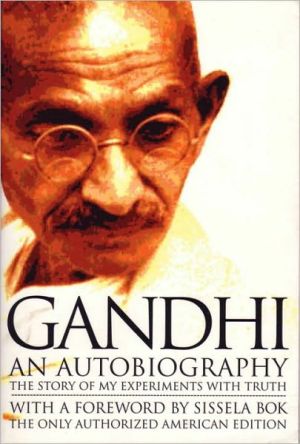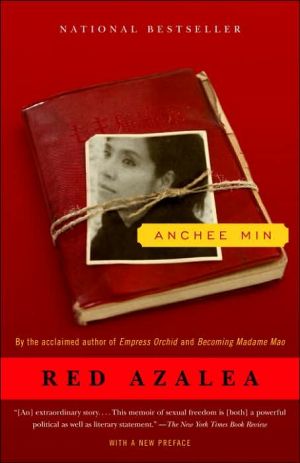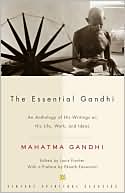Gandhi & Churchill: The Epic Rivalry that Destroyed an Empire and Forged Our Age
In this fascinating and meticulously researched book, bestselling historian Arthur Herman sheds new light on two of the most universally recognizable icons of the twentieth century, and reveals how their forty-year rivalry sealed the fate of India and the British Empire.\ They were born worlds apart: Winston Churchill to Britain’s most glamorous aristocratic family, Mohandas Gandhi to a pious middle-class household in a provincial town in India. Yet Arthur Herman reveals how their lives and...
Search in google:
In this fascinating and meticulously researched book, bestselling historian Arthur Herman sheds new light on two of the most universally recognizable icons of the twentieth century, and reveals how their forty-year rivalry sealed the fate of India and the British Empire.They were born worlds apart: Winston Churchill to Britain’s most glamorous aristocratic family, Mohandas Gandhi to a pious middle-class household in a provincial town in India. Yet Arthur Herman reveals how their lives and careers became intertwined as the twentieth century unfolded. Both men would go on to lead their nations through harrowing trials and two world wars—and become locked in a fierce contest of wills that would decide the fate of countries, continents, and ultimately an empire. Gandhi & Churchill reveals how both men were more alike than different, and yet became bitter enemies over the future of India, a land of 250 million people with 147 languages and dialects and 15 distinct religions—the jewel in the crown of Britain’s overseas empire for 200 years.Over the course of a long career, Churchill would do whatever was necessary to ensure that India remain British—including a fateful redrawing of the entire map of the Middle East and even risking his alliance with the United States during World War Two.Mohandas Gandhi, by contrast, would dedicate his life to India’s liberation, defy death and imprisonment, and create an entirely new kind of political movement: satyagraha, or civil disobedience. His campaigns of nonviolence in defiance of Churchill and the British, including his famous Salt March, would become the blueprint not only for the independence of India but for the civil rights movement in the U.S. and struggles for freedom across the world.Now master storyteller Arthur Herman cuts through the legends and myths about these two powerful, charismatic figures and reveals their flaws as well as their strengths. The result is a sweeping epic of empire and insurrection, war and political intrigue, with a fascinating supporting cast, including General Kitchener, Rabindranath Tagore, Franklin Roosevelt, Lord Mountbatten, and Mohammed Ali Jinnah, the founder of Pakistan. It is also a brilliant narrative parable of two men whose great successes were always haunted by personal failure, and whose final moments of triumph were overshadowed by the loss of what they held most dear. The Barnes & Noble Review Look beyond the hyperbolic subtitle and the breathlessly apocalyptic flourishes with which this big book begins and ends -- Arthur Herman would have made a great writer of advertisements for Hollywood epics of the Cecil B. DeMille variety -- and you will find a superb double biography of two major 20th-century figures, which is also therefore a superb history of the world their influence shaped.
Gandhi & Churchill The Epic Rivalry that Destroyed an Empire and Forged Our Age \ \ By Arthur Herman Bantam Copyright © 2008 Arthur Herman\ All right reserved.\ ISBN: 9780553804638 \ \ \ Chapter One\ \ \ The Churchills and the Raj\ \ And Blenheim’s Tower shall triumph O’er Whitehall—anonymous pamphleteer, 1705\ \ On November 30, 1874, another baby boy was born on the other side of the world. This one also first saw light in his grandfather’s house, but on a far grander scale—indeed, in the biggest private home in Britain.\ \ Surrounded by three thousand acres of “green lawns and shining water, banks of laurel and fern, groves of oak and cedar, fountains and islands,” Blenheim Castle boasted 187 rooms.1 It was in a drafty bedroom on the first floor that Jennie Jerome Churchill gave birth to her first child. “Dark eyes and hair” was how her twenty-five-year-old husband, Randolph Churchill, described the boy to Jennie’s mother, and “wonderfully very pretty everybody says.”2\ \ The child’s baptized name would be Winston Leonard Spencer Churchill. If the Gandhis were unknown outside their tiny Indian state, the Churchill name was steeped in history. John Churchill, the first Duke of Marlborough, had been Europe’s most acclaimed general and the most powerful man in Britain. His series of victories over France inthe first decade of the eighteenth century had made Britain a world-class power. A grateful Queen Anne gave him the royal estate at Woodstock on which to build a palace, which he named after his most famous victory. For Winston Churchill, Blenheim Castle would always symbolize a heritage of glory and a family born to greatness.\ \ Yet the first Duke of Marlborough had been followed by a succession of nonentities. If the power and wealth of England expanded to unimagined heights over the next century, that of the Churchills steadily declined.\ \ The vast fortune that the first duke accumulated in the age of Queen Anne was squandered by his successors. When Randolph’s father inherited the title in 1857, the same year the Great Mutiny raged in India, he had been faced, like his father and grandfather before him, by debts of Himalayan proportions and slender means with which to meet them. Randolph’s grandfather had already turned Blenheim into a public museum, charging visitors one shilling admission. Randolph’s father would have to sell off priceless paintings (including a Raphael and Van Dyck’s splendid equestrian portrait of King Charles I, still the largest painting in the National Gallery), the fabulous Marlborough collection of gems, and the eighteen-thousand-volume Sunderland library, in order to make ends meet.3\ \ In the financial squeeze which was beginning to affect nearly all the Victorian aristocracy, the Spencer-Churchills felt the pinch more than most. For Randolph Churchill, the Marlborough legacy was a bankrupt inheritance. In a crucial sense, it was no inheritance at all. His older brother, Lord Blandford, would take over the title, Blenheim, and the remaining estates. What was left for him, and for his heirs, was relatively paltry (although much more than the patrimony of the great majority of Britons), with £4,200 a year and the lease on a house in Mayfair.4\ \ So the new father, twenty-five-year-old Randolph, was going to have to cut his own way into the world, just as his son would. And both would choose the same way: politics.\ \ Randolph was the family rebel, a natural contrarian and malcontent. Beneath his pale bulging eyes, large exquisite mustache, and cool aristocratic hauteur was the soul of a headstrong alpha male. As he told his friend Lord Rosebery, “I like to be the boss.”5 Young Lord Randolph was determined to make a name for himself as a member of Parliament. All he needed was an issue.\ \ In 1874 an issue was not easy to find. At the time when Winston Churchill was born, British politics reflected a consensus that the country had not known in nearly a hundred years—and soon would never know again.6 The last big domestic battle had been fought over the Second Reform Bill of 1867, when crowds in London clashed in the streets with police and tore up railings around Hyde Park. Passage of the act opened the door to Britain’s first working-class voters. But almost a decade later neither Conservatives nor Liberals were inclined to let it swing open any wider.\ \ Both parties agreed that free trade was the cornerstone of the British economy, still the most productive in the world. Both agreed on the importance of keeping the gold standard. They even agreed that social reform was best left in private and local hands, although Parliament would occasionally give its approval to a round of slum clearances or a comprehensive health act. A twelve-hour day for the average workman, and ten and a half hours for women and young persons older than thirteen, made eminent good sense economically and morally. Giving them a government retirement pension or an unemployment check did not.7\ \ Tories and Liberals also agreed on maintaining an empire that was without rival and on defending it with a navy that was second to none. In 1874 that empire was not only the most extensive but the most cohesive on the planet.8 It emcompassed Britain itself, with England, Wales, Scotland, and Ireland welded together under a single government and crown. Across the Atlantic there were the islands of the West Indies and also Canada, the empire’s first self-governing “dominion”—a word that would loom large in the later battles between Churchill and Gandhi.\ \ Then there were the prosperous and stable colonies of white settlers in New Zealand and Australia which, although more than ten thousand miles away, felt a strong bond of loyalty to Britain and the Crown. Britain also directed the fate of two colonies in southern Africa, the Cape Colony and Natal, in addition to Lagos in Nigeria. Hong Kong, Singapore, and some scattered possessions in Asia and the Mediterranean completed the collection.\ \ But the centerpiece of the empire was India, where Britain was the undisputed master of more than a quarter billion people. In 1874 two out of every three British subjects was an Indian. Since the Mutiny both political parties had closed ranks about dealing with India. The power of the British system of governance, or the Raj as it was called after the Mutiny, had become more extensive and more streamlined. The opening of the Suez Canal in 1869 had also made it much easier to reach the ancient subcontinent than in the days before the Mutiny.\ \ Most Britons still knew almost nothing about the subcontinent or its peoples. Nonetheless, the fact that they possessed India, and governed it virtually as a separate empire, gave Britons a halo of superpower status that no other people or nation could match. The attitude was summed up nine years later in Rudyard Kipling’s poem “Ave Imperatrix”:\ \ And all are bred to do your will\ \ By land and sea—wherever flies\ \ The Flag, to fight and follow still,\ \ And work your Empire’s destinies.\ \ In the midst of this triumphant march to the future, the only hint of trouble was Ireland. The question of whether the Catholic Irish would ever enjoy any degree of “home rule” had become a live issue in Irish politics. In 1875 it sent Charles Stewart Parnell to Parliament, but otherwise Irish nationalism hardly registered in Westminster; nor did any other issue.*\ \ There seemed to be no burning questions to divide public opinion, no bitter clash of interests, no looming threats on the horizon for an unknown but ambitious politician to seize on. By 1880 Randolph realized he had only one way to get attention in Parliament: by becoming a nuisance and stirring things up.\ \ The issue Winston’s father seized upon was the Bradlaugh case. Charles Bradlaugh was a Liberal and a radical atheist who, when elected to Parliament that year, refused to take the oath of allegiance needed to take his seat in the Commons, because it contained the words “so help me God.” The question of whether Bradlaugh should be allowed to take his seat anyway stirred the hearts of many Conservative members, and Randolph’s friend Sir Henry Drummond Wolff asked his help against Bradlaugh.\ \ Randolph soon discovered that Bradlaugh made an easy target.9 He was not only a free thinker but a socialist, an advocate of birth control, and even a critic of Empire. Bradlaugh was also a radical republican who denounced the monarchy and aristocrats like Randolph in heated terms.† So when Randolph made his speech on May 24, 1880, condemning Bradlaugh for his atheism, he also read aloud from one of Bradlaugh’s pamphlets calling the royal family “small German breast-beating wanderers, whose only merit is their loving hatred of one another.” He then hurled the pamphlet on the floor and stamped on it.\ \ The House was ecstatic. “Everyone was full of it,” Jennie wrote, who\ \ * It would be registering sooner than most realized. Ironically, Kipling’s triumphant poem was composed in 1882, after the exposure of an Irish plot to assassinate Queen Victoria, to reassure the British public. Winston Churchill’s earliest childhood memory was of wandering through Dublin’s Phoenix Park and seeing the point where the British viceroy had been murdered only a couple of years earlier.\ \ † He would also be one of the first champions of Indian nationalism. When he died in 1891 and was buried in London’s Brookwood Cemetery, among the three thousand mourners who attended the funeral would be a young Mohandas Gandhi.\ \ had watched the speech from the gallery, “and rushed up and congratulated me to such an extent that I felt as though I had made it.”10 Lord Randolph Churchill’s career was launched as a sensational, even outrageous, headline-grabber. Together with Wolff and another friend, Sir Henry Gorst, he formed what came to be known as the Fourth Party,* a junta of Tory mavericks who ripped into their own party leaders any time they sided with the government, to the delight of journalists and newspaper readers.\ \ Suddenly, thanks to Randolph Churchill, politics was fun again. When Bradlaugh was reelected in spite of being denied his seat, Randolph attacked him again, carefully playing it for laughs and for the gallery and the news media; when the voters of Northampton insisted on returning Bradlaugh again, Randolph did the same thing. And then a fourth and a fifth time: at one point Bradlaugh had to be escorted out of the House chamber by police and locked up in the Big Ben tower. Some people began to joke that Randolph must be bribing Northampton voters to keep voting for Bradlaugh, since they were also keeping Randolph in the headlines.11\ \ Lord Randolph had the good sense to realize that while the Bradlaugh case had launched his political rise, he needed more substantial issues to sustain it. He tried Ireland for a while, taking up the cause of Ulster Protestants in the North and lambasting the Irish nationalists of the south. He tested a new catchphrase, “Tory Democracy,” urging Conservatives to win votes and allies among Britain’s newly enfranchised working class—but the phrase had more headline appeal than substance or thought behind it. He even tried Egypt, furiously denouncing the Liberal government’s support of its corrupt ruler. Finally in the summer of 1884, the man an American journalist called “the political sensation of England” turned to India.\ \ Crucial though India was to the empire, few politicians had any expertise in the empire’s greatest possession. In November 1884 Churchill planned a major tour of India. His friend Wilfred Blunt, who had already traveled widely there, set up the key introductions. He predicted “a great future for any statesman who will preach Tory Democracy in India.”12 Lord Randolph left in December and did not return to London until April 1885, after logging more than 22,800 miles. He then delivered a round of fiery speeches denouncing the Gladstone government’s\ \ * After the Liberals, Tories, and Irish Nationalists.\ \ policies there, from neglecting the threat from Russia to failing to gain more native participation in the Raj. The speeches established him as the Conservatives’ “front line spokesman on India.”13 So when they returned to power in June that year, he was the obvious candidate for secretary of state for India.\ \ In terms of direct influence over people’s lives, it was the single most powerful position in the cabinet, even more powerful than prime minister. At age thirty-six, Randolph Churchill would be overseeing an imperial domain that was, as he discovered in his travels and readings, unique in British history—perhaps unique in human history.\ \ \ How the British built an empire in India, conquering one of the most ancient and powerful civilizations in the world, is an epic of heroism, sacrifice, ruthlessness, and greed. But it is also the story of a growing sense of mission, even destiny: the growing conviction that the British were meant to rule India not only for their own interests but for the sake of the Indians as well. That belief would decisively shape the character not only of the British Empire in India but also of Randolph’s son Winston Churchill—the man into whose hands the destiny of the Raj would ultimately fall.\ \ Ironically, that empire’s founding fathers, the group of God-fearing merchants living in Shakespeare’s London who created the Honorable East India Company, never intended to go to India at all—any more than Queen Elizabeth I did when she gave them a royal charter on the last day of 1600. Their aim was to get to the Spice Islands (the Molucca Islands in today’s Indonesia), where Spanish, Portuguese, and Dutch merchants and adventurers were battling over fortunes in nutmeg, cloves, and mace. The East India Company’s initial stop at Surat, on India’s west coast, was supposed to be only a layover for ventures farther east.\ \ But when the Dutch tortured and murdered ten of their merchants in the island of Amboyne in 1623 and foisted the English out of the Spice Islands, the London-based company had nowhere else to go.14 By 1650, the year John Churchill was born in Devon, the East India Company found itself precariously perched in a tiny settlement near Surat called Fort St. George, doing business at the pleasure of the rulers of India, the Mughal emperors—at the time probably the richest human beings in the world. In 1674 the company acquired a similar outpost at Bombay, which King Charles II had received as a wedding present from the king of Portugal. Then in 1690 it built another, in Bengal at Kalikat, which the English pronounced Calcutta. \ \ Continues... \ \ \ \ Excerpted from Gandhi & Churchill by Arthur Herman Copyright © 2008 by Arthur Herman. Excerpted by permission.\ All rights reserved. No part of this excerpt may be reproduced or reprinted without permission in writing from the publisher.\ Excerpts are provided by Dial-A-Book Inc. solely for the personal use of visitors to this web site. \ \
1 The Churchills and the Raj 152 Lord Randolph Takes Charge 353 Illusions of Power: The Gandhis, India, and British Rule 514 Awakening: Gandhi in London and South Africa, 1888-1895 695 Awakening II: Churchill in India, 1896-1899 916 Men at War, 1899-1900 1117 Converging Paths, 1900-1906 1298 Brief Encounter, 1906-1909 1489 Break Point, 1909-1910 16310 Parting of the Ways, 1911-1914 18111 A Bridgehead Too Far, 1914-1915 19812 Gandhi's War, 1915-1918 21513 Bloodshed, 1919-1920 23914 Noncooperation, 1920-1922 26115 Reversal of Fortunes, 1922-1929 28316 Eve of Battle, 1929 30917 Salt, 1930 33218 Round Tables and Naked Fakirs, 1930-1931 34719 Contra Mundum, 1931-1932 36420 Last Ditch, 1932-1935 38221 Against the Current, 1936-1938 40222 Edge of Darkness, 1938-1939 42723 Collision Course, 1939-1940 44324 From Narvik to Bardoli, April 1940-December 1941 45725 Debacle, 1941-1942 47226 Quit India, 1942 48827 Showdown, 1943 50328 Triumph and Tragedy, 1943-1945 51729 Walk Alone, 1945-1947 54030 Death in the Garden, 1947-1948 56331 Lion in Twilight, 1948-1965 588Conclusion: Triumph and Tragedy 606Significant Dates 611Glossary of Terms 615Acknowledgments 619Notes 623Reference List 673Index 687Photograph credits 719
\ Edwin M. Yoder Jr.Herman's book focuses on two imposing figures who epitomized the clash between traditional imperialism and the gathering anti-colonial insurgency, and he tells their stories stylishly and eloquently…he has probed beneath the stereotypes to show that Gandhi, like Churchill, was an unpredictable maverick and that Churchill's doubts sprang from genuine worry that an independent India could be ripped apart by the communal stresses of her countless sects, castes, languages and regions.\ —The Washington Post\ \ \ \ \ Publishers WeeklyHistorian Herman (How the Scots Invented the Modern World) paints a forceful portrait of the emergence of the postcolonial era in the fateful contrast-and surprising affinities-between two historic figures on opposite sides of the struggle for Indian independence. Churchill and Gandhi, both elites in their respective milieus, began their careers with remarkably similar perspectives and trod intersecting paths across India, South Africa and England. They shared an obsession with physical courage (albeit channeled in different ways) that tied conceptions of masculinity to larger ideas of racial identity and moral superiority-and India loomed large in their triumphal careers, ultimately frustrating both men's idealism. While Herman's dual biography artfully depicts the personalities of the two men, he gives short shrift to the more complex forces of British imperial decline, Indian nationalism and the emergence of the postwar order (for example, Herman helpfully but also too neatly explains the dogged centrality of India and the British raj in Churchill's worldview as an act of filial loyalty to his beloved father) But the author also takes careful account of the constellation of modern and antimodern currents of late Victorian thought in situating these vastly influential figures in a fascinating narrative of their times. (May)\ Copyright © Reed Business Information, a division of Reed Elsevier Inc. All rights reserved.\ \ \ Library JournalThe complex task of drawing comparison and contrast between two of the most chronicled lives of the 20th century is easily and compellingly handled by Herman (How the Scots Invented the Modern World). Spanning the globe and dozens of decades, Herman never sinks into the clichés of these two men's biographies but rather deconstructs some of the cherished myths surrounding them while maintaining a warm and lively tone. From India to South Africa to London, they seemed to cross paths in life yet could never reach a true understanding of each other. Churchill, the ardent defender of the British Empire, had trouble accepting modern political realities and fixated upon Gandhi as the ultimate threat to his beloved England's legacy. Gandhi, in turn, achieved global superstar status but could not unite Indian politics and eventually became a hindrance, then an irrelevance, to Indian independence. These two men may have been presented historically as enemies, or at least proxy enemies, but Herman brings out the true issues that divided them yet made them remarkably similar holdovers of the Victorian era. Highly recommended for public and academic libraries. [See Prepub Alert, LJ1/08.]\ —Elizabeth Morris\ \ \ \ \ \ Kirkus ReviewsVeteran historian Herman (To Rule the Waves: How the British Navy Shaped the Modern World, 2004, etc.) offers an ambitious, reasoned joint biography of two great men. Each was a late-Victorian political figure who continued to lead into the mid-20th century. Each held an exemplary vision for his country that initially and spectacularly prevailed, but ultimately collided with new modern realities. Born to a well-to-do Hindu family in the western province of Gujarati, Mohandas Gandhi (1869-1948) was groomed in the English educational system to be a barrister and spent a formative period studying in London. His first experience of racial discrimination was in South Africa, where he worked for the enfranchisement of indentured servants. Winston Churchill (1874-1965), son of an aristocrat who was briefly secretary of state for India, inherited his father Randolph's unshakeable belief in Britain's imperial mission to the subcontinent. While both Gandhi and Churchill had absorbed the idea of empire as "a moral force, an institution of order and civilization," Gandhi's view would change drastically. He gradually repudiated Britain for its criminal subjugation and tyranny, fashioning a new spiritual creed from his deep philosophical readings, during his many jail stints, of Tolstoy, Ruskin and the Bhagavad Gita. Churchill rejected Gandhi's brand of religious "fanaticism," which he believed threatened to engulf the civilized Christian world in paganism and darkness. When Gandhi returned to India and joined national politics, he developed his belief in ahimsa (nonviolence) to embrace methods of satyagraha (passive resistance) in order to challenge the Raj's paternalistic, restrictive policies.Churchill opposed him at every step, passionately rejecting, for example, Viceroy Lord Irwin's advocacy of dominion status for India in 1929. Herman's measured portrait of each man conveys his entire worldview, shaped by class, history and education. Each proved great and flawed in different ways. A well-wrought historical narrative that adds significantly to our understanding of both figures. Agent: Glen Hartley/Writers' Representatives\ \ \ \ \ The Barnes & Noble ReviewLook beyond the hyperbolic subtitle and the breathlessly apocalyptic flourishes with which this big book begins and ends -- Arthur Herman would have made a great writer of advertisements for Hollywood epics of the Cecil B. DeMille variety -- and you will find a superb double biography of two major 20th-century figures, which is also therefore a superb history of the world their influence shaped. \ Herman -- the author of How the Scots Invented the Modern World -- has a genius for compelling historical narrative, and he is as generous to the virtues as he is clear-eyed to the failings of his two principals. Together these qualities make his book the kind that keeps you reading well past bedtime, and overrun your lunch hour.\ It is also a book that has a surprising effect, which is that if you had preconceptions of the Gandhi-good, Churchill-sometimes-not-so-good variety, you might turn the last page with a sense of having had your notions inverted. It seems almost sacrilegious to think that a vegetarian lover of peace, a man of deep spirituality, pacifism, a fighter for justice, a Saint Theresa to the poor of India and the victims of its civil strife, a man described by India's last Viceroy, Lord Mountbatten, as "the equal of Buddha and Jesus Christ," should come out of Herman's scrupulous portrait in rather equivocal fashion.\ But so he does. That he was sincere in his principles, and had enormous courage, there is no doubt. But when he lived in South Africa and campaigned for the rights of Indian immigrants there, he did so on frankly racist grounds; he wanted Indians and whites to be equals and segregated from blacks; he repeatedly wrote and said that it was an insult to Indians to be placed on the same footing as black people.\ In India during the three decades of campaigning for independence from Britain, Gandhi was indifferent to the real possibility of civil mayhem such as indeed occurred when the Raj ended. He regarded it as a price worth paying for the end of British rule, because any price was worth paying, even the slaughter and displacement of millions. In a similar vein, in the midst of the titanic struggle between the Allies and the Axis powers, Gandhi worked against British anti-Japanese efforts in India and Burma, calling for the complete and immediate withdrawal of British forces. He viewed Japanese occupation with indifference, believing that if everyone would follow his example of nonviolent noncooperation, the Japanese would be forced to leave.\ He had learned long before, in his South African campaigns of nonviolent resistance against immigrant registration laws, how unworkable such campaigns are. But the call for them gave Gandhi the moral high ground, and he used it to effect, both good and ill; Herman shows that he single-handedly derailed the British plan for a federal India that would have kept it united and avoided the hideous slaughter of the India-Pakistan partition.\ And as this portrait of the tainted saint with his spinning wheel and stubbornly holy lifestyle unfolds, Herman traces the controversial career of the ambitious, bumptious, self-serving, mercurial Winston Churchill, from arrogant young soldier in India to the bulldog statesman who by eloquence, stubbornness, and power of leadership resisted Hitler. For the two years that Britain stood alone against the conqueror -- for some months in the summer of 1940 winning a new Battle of Thermopylae, the Royal Air Force's celebrated Few holding the pass against the accumulated might of Wehrmacht and Luftwaffe -- the single steel thread that held the defense together was Churchill's will.\ From his childhood years, when his father, Lord Randolph Churchill (callously indifferent to his doting son), was secretary of state for India, until the day of his death over 70 years later, Churchill believed that Britain must do everything to retain possession of India, its empire's jewel. "India" in administrative and imperial terms meant a vast swathe of the world from Aden on the Arabian Peninsula to Burma and Singapore. He rightly foresaw that the end of British rule there would mean the end of empire itself. He believed, with complete sincerity and a modicum of justice, that British rule was civilizing and positive. When Indian independence happened he accepted its inevitability; but he believed that it could have been avoided if his own earlier plans for a new constitutional settlement had been accepted.\ That was not a belief the Gandhi could ever have shared. Gandhi's view, that India must gain independence at any price, was not simply an outlook natural to a patriot and the son of a great and ancient civilization, but the conviction of a converted zealot. As Herman shows, for a considerable slice of Gandhi's life, indeed right to the margin of middle age, he was passionately pro-British. He believed in the ideal enunciated by Lord Macaulay, of a people "Indian in appearance, British in heart and education." He described himself as British, qualified as a barrister in London's Inns of Court, wore a suit and tie, was a devotee of Ruskin's writings as much as he later was of Tolstoy's, and generally aspired to the condition and status of an English gentleman.\ With such a background it was inevitable that the reaction should be complete. When he turned against Britain his rejection was total. He adopted the dress and lifestyle of a wandering holy man; Churchill called him a "fakir" and a "fanatic." And in a sense he was both.\ Although Herman's narrative suggests the fate of India turned on a personal clash between the two men, it was of course a larger battle between many different camps, and the two men in question only met once, in the first decade of the 20th century, when Gandhi (in suit and tie) led a delegation to London from South Africa, asking for equal status for Indians and segregation from the blacks, and Churchill was deputy to the colonial secretary. Churchill was sympathetic; but the situation of Indians in the former Boer republics lately conquered by Britain (because gold had been found in great quantities there) did not allow principle to trump Realpolitik. It almost never does.\ This is an instructive book in many ways and in many of its details. Just one telling example suffices to illustrate how: in a despatch from the North-West Frontier, after the Malakand campaign in which he took part, Churchill wrote: "Civilisation is face to face with militant Mohammedanism." The year was 1897; Malakand is one of the places where today's Al-Qaeda and Taliban hide out and cross into strife-torn Afghanistan from Pakistan.\ Exhilarating all the way through, Herman's book is also very poignant at the end. Both men came to think that they had failed after all, the one in losing India and the other in realizing too late the extent of the price paid in gaining it. --A. C. Grayling\ A. C. Grayling is an author, playwright, reviewer, cultural journalist, and professor of philosophy at London University. Among his many books are Towards the Light of Liberty and The Choice of Hercules. His play Grace was recently performed in New York City.\ \ \
